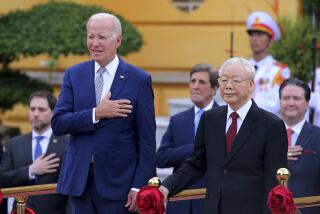U.S. to Discuss MIAs and Some Aid to Hanoi
- Share via
HANOI — A White House-appointed delegation agreed Monday to discuss humanitarian aid for Vietnam in return for a resumption of talks aimed at accounting for American servicemen reported as missing in action or held as prisoners of war during the Vietnam conflict.
In a brief statement issued at the end of three days of meetings here, the two sides declared that the discussions were limited to humanitarian concerns, including the MIA-POW issue, and were not linked to questions of diplomatic relations or U.S. economic aid.
Washington provides no aid of any kind to the pro-Soviet government of Vietnam, victors in the war of the 1960s and early 1970s over the U.S.-backed South Vietnamese regime.
New Meetings Due
The 107-word statement said two sets of meetings will take place in the near future, “one to discuss next steps to resolve MIA issues and one to discuss urgent Vietnamese humanitarian concerns.”
Gen. John W. Vessey Jr., the former chairman of the Joint Chiefs of Staff who is President Reagan’s hand-picked emissary, refused to answer questions after the statement was read to a crowded room of reporters and diplomats. A European diplomat told a handful of reporters earlier that the Americans were talking about such humanitarian aid as artificial arms and legs for Vietnamese who were wounded during the war.
Foreign Minister Nguyen Co Thach, head of the Vietnamese delegation, also refused to answer questions, other than replying “Many” when asked to describe his government’s humanitarian concerns.
Vessey’s professed goal in coming here was to achieve a resumption of technical talks on resolving the fate of nearly 1,800 American servicemen, still unaccounted for in Vietnam since the end of the war in April, 1975. The talks were broken off last fall by the Vietnamese, who at first blamed conflicts with their domestic political schedule but more recently have indicated that they wanted something in return for continuing the talks.
What the Vessey mission did achieve was a resumption of the talks, but with no apparent set timetable. In January, 1986, an American delegation headed by Assistant Defense Secretary Richard L. Armitage left Hanoi with a schedule on technical talks on the MIA issue. Six meetings a year were planned, and in a session that April, the Vietnamese turned over what were said to be the remains of 21 American servicemen.
Later that month, however, Hanoi canceled the scheduled meeting to protest the U.S. bombing of Libya. There have been no talks since last October.
‘Urgent Concerns’
Now, according to the Vessey-Thach statement, “specific measures” have been agreed upon “to accelerate progress toward accounting for Americans missing in Vietnam and to address certain urgent humanitarian concerns of Vietnam. . . . The two sides have undertaken to work methodically and seriously on these humanitarian issues.”
Vessey was accompanied here by a party of five, including Richard Childress, the National Security Council official who has spearheaded U.S. efforts on the MIA-POW issue, and Ann Mills Griffiths, head of the League of Families, an MIA support group, which has worked with conservative congressmen to keep MIAs as a priority issue for the Reagan Administration.
In the talks here, held at the state guest house, both sides kept an absolute lid on information about their discussions. Vessey said little beyond “more work has to be done” during the three days of talks that began Saturday morning.
Details Not Disclosed
The five-paragraph statement, containing no details of steps to be taken on the MIA issue other than future “meetings of experts,” was the only official comment. The Vietnamese side apparently did not raise its demand for $3 billion in U.S. economic aid reportedly promised by then-President Richard M. Nixon at the time of the 1973 Paris peace accords. U.S. officials have said that no valid pledge was made.
U.S. diplomatic recognition of Vietnam is impossible as long as Vietnamese troops continue their eight-year occupation of neighboring Cambodia, Washington has decreed.
More to Read
Get the L.A. Times Politics newsletter
Deeply reported insights into legislation, politics and policy from Sacramento, Washington and beyond. In your inbox twice per week.
You may occasionally receive promotional content from the Los Angeles Times.










